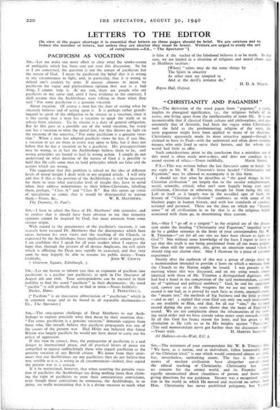LETTERS TO THE EDITOR [In view of the paper shortage
it is essential that letters on these pages should be brief. We are anxious not to reduce the number of letters, but unless they are shorter they must be fewer. Writers are urged to study the art of compression.—Ed., " The Spectator 1
PACIFICISM AS VOCATION
Snt,—Let me make one more effort to clear away the smoke-screen of ambiguity which has been sent out over this discussion. So far as I am concerned, the question is not the nature of pacificism but the nature of God. I mean by pacificism the belief that it is wrong in any circumstance to fight, and, in particular, that it is wrong to defend one's country by arms. If anyone chooses to mean by pacificism the vague and platitudinous opinion that war is a bad thing, I cannot help it. At any rate, there are people who are pacificists in my sense and, until I have evidence to the contrary, I shall assume that the Archbishops were talking to them when they said " For some pacificism is a genuine vocation: About vocation. Of course a man has the duty of stating what he sincerely believes and of acting upon it. It is perhaps rather grandi- loquent to speak of the obligation to be sincere as a vocation, since it is like saying mat a man has a vocation to speak the truth or to refrain from adultery. To be sincere is a duty of general obligation. But let this pass as a possible use of the word vocation, for every one has a vocation to obey the moral law, but this throws no light on the meaning of the sentence, " For some pacificism is a genuine voca- tion." When a man has adopted pacificist views he has, if you like, a vocation to act on them in every way open to him, but it does not follow that he has a vocation to be a pacificist. His presuppositions may be wrong, as in fact the Archbishops believe them to be, and wrong principles are bound to lead to wrong action. I simply do not understand on what doctrine of the nature of God it is possible 'o hold that He calls some men to hold principles which are false and do actions which are wrong.
The suggestion that this problem is solved by the idea of different levels of moral insight I dealt with in my original article. I will only add that if this is the position of the Archbishops, it will be necessary for them to state what particular level of insight they have in mind when they address exhortations to their fellow-Christians, labelling them, perhaps, " Class A " and " Class B." But this opens up vistas of speculation so comic that it would be disrespectful to pursue


























 Previous page
Previous page